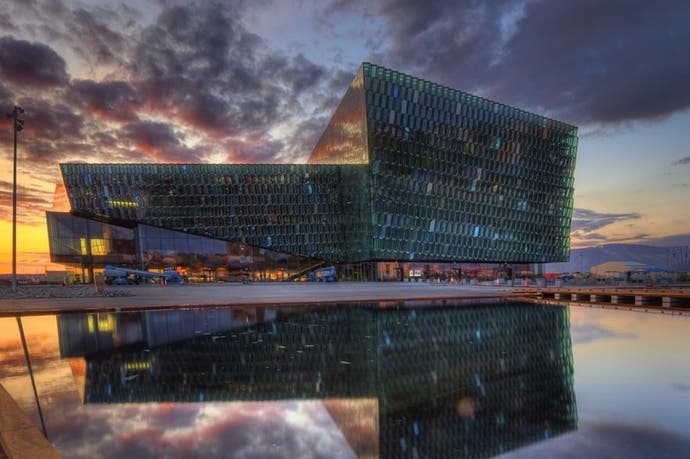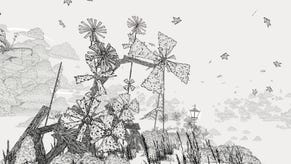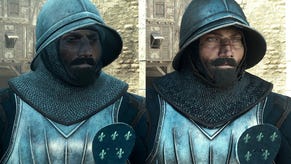How video games could save your life
Life, the universe and everything at CCP Fanfest.
From the archive: With this year's Eve Fanfest just around the corner, it seemed like a good moment to revisit this piece from April 2015 about last year's event. With CCP adopting a more workmanlike commitment to Eve Online's future - rather than the wide-eyed ambitions of old - its annual jamboree in Reykjavik had never felt more like videogaming's TED conference.
“We came up with a crazy idea. Why don't we take these scientific research problems, transform them, and then inject them into major computer games as seamless gaming experiences that are completely integrated into game mechanics?”
Attila Szantner was inspired by citizen science projects like Zooniverse to create a platform called Massively Multiplayer Online Science (MMOS), a new way to provide amateur science enthusiasts with the means to analyse real-world data, and make meaningful contributions to the progress of scientific discovery. Despite the continued accelerating growth of computing power, citizen science solves a crucial problem for research: humans possess the gift of abstract insight, whereas silicon does not.
The solution he and his team are proposing in partnership with CCP at Fanfest 2015 not only expands the range of citizen science to a potentially new audience, it also solves some of the key problems in this area of research. The older the project, for example, the weaker the engagement with it becomes. A huge percentage of a project is also typically completed by a minority of users. Should they leave, the impact on the research can be catastrophic. He and his colleagues believe that by embedding this work within meaningful gameplay systems, these problems - and others - can be eliminated.
Simplistically, it's believed that errant proteins are the cruel instruments of cancers and degenerative diseases like Alzheimer's and Parkinson's. For the purposes of Eve Online's proposed opening salvo in the fight against these devastating afflictions, the prototype example shown off at Fanfest is of a protein classification project.
On the left of an in-game window sits one of the countless protein samples awaiting classification, while on the right are half a dozen samples. Your task is to choose which of the multiple options presented most closely resemble the main image. In the context of Eve Online, there's a little light screen chatter about the analysis of Jovian tissue samples - a primitive narrative at this stage, but a crucial thematic connection that ensures the persistence of Eve's escapist illusion.
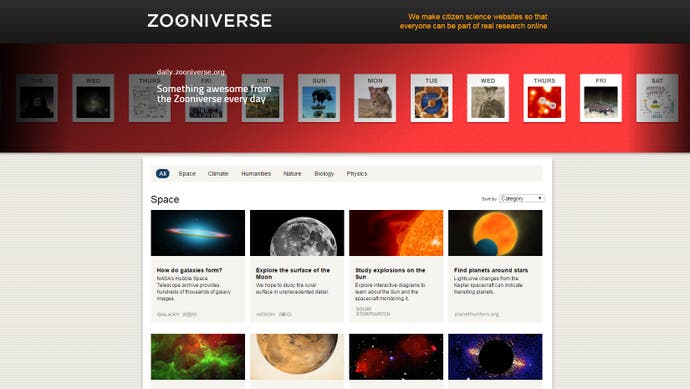
At every stage of the talk, the developers at CCP and their research partners are vigilant at reaffirming the importance of engaging the community when it comes to deciding just how far this collaboration can be taken. The initiative is warmly embraced at Fanfest, but the relatively small pool of twenty or so players taking part in the debate represents a tainted sample, one ideologically motivated to attend this panel over any number of the other discussions taking place.
There are divisive subtleties too, even within this enthusiastic pocket of players. In the roundtable debate that follows the main presentation, some players advocate for integrating the research more directly into gameplay, with thematically sensible in-game rewards for participation. Others caution against taking the project beyond the realms of altruistic motivation. Regardless, there will be measures to ensure the integrity of the final data, with multiple levels of redundancy built into the distribution of data sets amongst the playerbase.
How and when these gamified research elements will be presented in Eve Online will also depend on the suitability of a project for the gameplay task at hand. It may, for example, make more sense to present those who opt into the research a moon crater classification project as part of the in-game mining experience.
Fine details aside, you're unlikely to ever be the researcher who shouts 'Eureka!', yet you may be the source of their serendipitous discovery, nudging the right protein with the wrong characteristic towards the one scientist who reads the relevant paper. Should this project end up playing a meaningful part in the war against these individual human tragedies, it'll likely follow the story of a kingdom in want of a nail.
Simon Brodie has worked in the Royal Air Force for nearly 28 years, a career that has included operational deployments in the Balkans. In Eve Online, he's the assistant training manager at Eve University, the go-to starting home for many new players arriving in New Eden. At Fanfest, and by way of the dominant military doctrines of Carl von Clausewitz and Sun Tzu, he's explaining optimal warfare policy in the game.
He's a straight-talking, yet warm and mischievous speaker who thoughtfully paces back and forth throughout his presentation. He's as confident at engaging the crowd in two-way debate as he is at criticising both in-game and real world conflict strategies from Korea to Vietnam and Afghanistan. Few of the most notable stumbles on the real and virtual battlefields of history are spared from his blunt assessments, but his apparent expertise ensures the multinational audience remains good-humoured throughout.
The points of debate flow thick and fast. How can you fight a war without clearly defined objectives? What is the real purpose of your battle? Why are you even engaging in conflict? Ultimately, strategic success comes from identifying the opponent's centre of gravity, their critical point through which a precise twist of the knife can unravel all else and ensure absolute destruction.
For Eve University, that weakness is its reputation - without which it could no longer exist - rather than the loss of replaceable ships flown by inexperienced pilots. For another Corporation, it might well be those more tangible tools of war - ships, supply lines, finance and so on.
These are the lessons from historical real life conflict that can bleed into Eve Online in order to better its unique brand of entertainment, but there are few lessons that a digital diversion can offer the warfare reality of human evisceration. Instead, there's a different kind of human interaction flowing out of Eve Online and into the world, and it's one that can also be a matter of life and death.
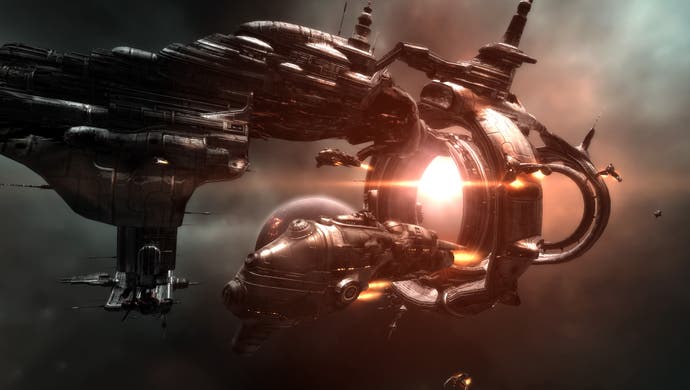
Broadcast4Reps is an in-game channel where troubled gamers can find a space for themselves and be heard. Some of its users are simply struggling with a bad day and are in need of a little advice, while others are coping with the day-to-day difficulties of ongoing mental health issues. A community of amateur listeners and qualified therapists - including Brodie himself - seek to provide a buffer of sorts.
The quiet appeal to support this programme at the end of the session is one of the more poignant moments at Fanfest this year, coming as it does immediately after a lively debate that contrasts so sharply with the project's compassionate aims. It's also a reminder that this famously ruthless universe is one populated by a single, tightly-woven community that transcends the power-gulfs and politics that otherwise divide players in-game.
"While there is a gamer stereotype that people laugh at, there's an element that a number of computer gamers are on the autistic spectrum - and people on the autistic spectrum have a significantly higher chance of picking up mental health issues," explains Brodie.
"You're going to find gamers that are potentially socially isolated, picking up mental health problems, and some of the only support they've got is their online friends who could be all the way around the world, and they've never met.
"It's saying to people that the situation potentially isn't as bad as they think it is, and helping them find the coping strategies within them. They've got this strength, and it's about showing people how strong they are, and the coping strategies they have.
"Sometimes sorting your issues out isn't as complicated as it feels. I say to people that a lot of mental health problems feel like eating an elephant. If someone told you to eat an elephant, you'd think it was impossible, but you eat an elephant the same way you eat a sandwich: one bite at a time.
"You break the big problems down into lots of little problems, and people can handle little problems - just one at a time."
Like so many scientists of his generation, it was the books of Isaac Asimov and the sight of Neil Armstrong stepping from the lunar module that inspired astrobiologist Dr. David Grinspoon to pursue a life in science.
To say that Grinspoon deals with the big questions is to put it lightly. His is the study of life on a cosmic scale, and what humanity's current predicament on earth can tell us about the potential for life and civilisations to propagate on an interstellar level. His talk on the second day of Fanfest commands a rapt audience - unsurprising, given his status as a recipient of the Carl Sagan Medal for public speaking on planetary science.
As part of his work, he's identified what he sees as a need to wake up and change our opinion of ourselves. To remove the negative language associated with our impact on the world. We rape the rainforests, for example. We're a cancer on the environment. There's the impact of the human footprint. Instead, he prefers to use more positive metaphors conjectured by others, including the idea that we are the emerging nervous system of the planet, one that's capable of repaying our debt and atoning for our mistakes.
"When we think about the human influence on earth's environment, some people don't like it as they think it's arrogant," he says. "I think there's a danger in arrogance and tinkering without understanding, but I believe in the possibility of humans to use powerful technology in positive ways."
"We've got a lot to learn. Maybe we don't deserve it, but we are running this planet and we have to figure out how to do it well. It doesn't help to just talk about how we suck, which is what it seems like a lot of environmentalists are stuck on."
"It can actually lead to this nihilism, where we don't feel empowered to affect our future."
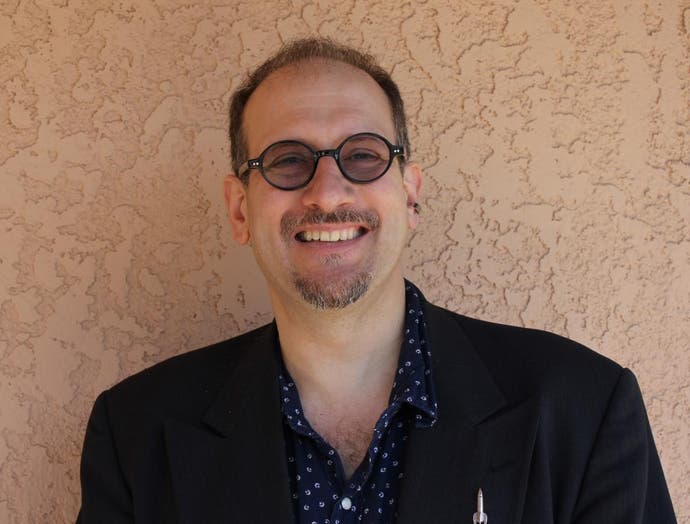
Grinspoon also believes that we're currently existing in a crucial bottleneck period of human history. Find a way of surviving the next two hundred years or so, and we could survive with infinite potential. It will take technology, ingenuity and commitment to get there, and that will require scientists. Can video games assume the role of Asimov, Armstrong and Aldrin in firing the imaginations of the next generation of scientists?
"I see people playing these games, and they're so complex and immersive, and talk about imagination - it's collective imagination now, it's not just an author. I can totally see how that would inspire both scientists and science of the future."
"If I were now the age that I was when those Isaac Asimov books blew my mind and made me get into science, I think it would probably be something like Eve playing that role in my life. I can totally see that young people, thinking about what they're doing in their lives, this would be part of what would inspire them."
In an age of mass consumption of all kinds of media - not just video games - and on all kinds of devices, I suggest to David that there's a danger that, rather than merely inspiring the scientists needed to survive this bottleneck, these experiences might instead absorb them. Perhaps our willingness to be seduced by technology and technological experiences represents a threatening distraction from the task at hand.
"I don't see that as a threat. I totally see that these technologies are changing us, and I just had a demo of this really intense VR thing [Eve Valkyrie]. I've never done anything like it, and I can totally see that that's going to be something people are going to spend time on, but is that bad or dangerous? I don't know. It's definitely going to change us, and change the way we interact. I don't see it as inherently bad.
"There have been so many technologies come along. The printing press changed things just as radically - if not more radically - than these heads-up displays ever will. Who knows, maybe it will become comparable, and if it's comparable that would mean it turns us into a completely new species really. There's a certain part of me that welcomes that change, because we need some kind of kick in the ass.
"Maybe these new ways of being connected will come about because the way people are amusing themselves will end up being the thing that links us together. I guess I would just say let's not fear that future, but let's just go into it trying to carry forth these values that those of us who are thinking about these things care about. Let's become global, and try to speak and act for the earth, and try to become one of those civilisations that is able to use technology to actually ensure a long life.
"We're almost there."
If you are having suicidal thoughts, or any other mental health issues, there are people who can help you. In the UK, The Samaritans provide free, confidential support 24 hours a day, every day of the year.
This article was based on a press trip to Reykjavik. CCP paid for travel and accommodation.
